Hazvinei Sakarombe aka DJ Chilli Bae, radio host on Power FM Zimbabwe
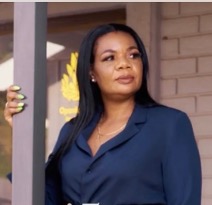 This journey began with a youth-centered radio station broadcasting several programmes on climate change. Its aim was, and continues to be, to take climate science beyond academia and make it accessible to everyone. Driven by a passion for community engagement, Hazvinei, the radio host, recalls the early days of the programme: “The first time was challenging, but the second time was good, and there was an exchange with listeners.” Its goal was simple, yet deeply ambitious — to tackle the lack of knowledge about climate change and foster a deeper understanding of the issue among their listeners. When the programme first aired, she told us the response was disheartening. “Many listeners were unaware of what climate change meant. The information available was too technical and not translated into local languages, leaving many feeling disconnected from the topic.” For her, the complexity of climate science made it very difficult to speak directly about the listeners’ immediate concerns, such as putting food on the table.
This journey began with a youth-centered radio station broadcasting several programmes on climate change. Its aim was, and continues to be, to take climate science beyond academia and make it accessible to everyone. Driven by a passion for community engagement, Hazvinei, the radio host, recalls the early days of the programme: “The first time was challenging, but the second time was good, and there was an exchange with listeners.” Its goal was simple, yet deeply ambitious — to tackle the lack of knowledge about climate change and foster a deeper understanding of the issue among their listeners. When the programme first aired, she told us the response was disheartening. “Many listeners were unaware of what climate change meant. The information available was too technical and not translated into local languages, leaving many feeling disconnected from the topic.” For her, the complexity of climate science made it very difficult to speak directly about the listeners’ immediate concerns, such as putting food on the table.
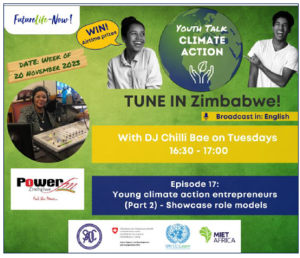 Determined to make a difference, the radio Station revamped its approach. The team simplified its language and started to use more relatable terms and everyday examples of climate change and its implications. It also introduced interactive segments where listeners could ask questions and share their experiences live. Another important decision to shorten the distance with listeners and local communities was translating the content into Shona and Ndebele languages. The second radio episode programme was met with enthusiasm. After a few adjustments, the listeners who had previously expressed a lack of interest in the topic started to understand the everyday connections between their own livelihoods and climate change. Among other examples, Hazvinei recalls, “They learned about the impact of El Niño on their drought conditions and the role of climate change in increasing the frequency of cyclones”.
Determined to make a difference, the radio Station revamped its approach. The team simplified its language and started to use more relatable terms and everyday examples of climate change and its implications. It also introduced interactive segments where listeners could ask questions and share their experiences live. Another important decision to shorten the distance with listeners and local communities was translating the content into Shona and Ndebele languages. The second radio episode programme was met with enthusiasm. After a few adjustments, the listeners who had previously expressed a lack of interest in the topic started to understand the everyday connections between their own livelihoods and climate change. Among other examples, Hazvinei recalls, “They learned about the impact of El Niño on their drought conditions and the role of climate change in increasing the frequency of cyclones”.
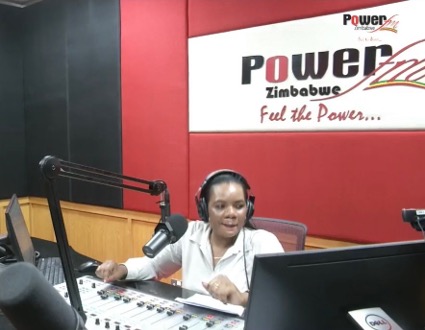
Feedback from the audience was overwhelmingly positive and many reported a shift in their attitude towards climate issues. They started discussing ways to conserve water and reduce waste and, at the same time, schools and community groups began using the information broadcasted to drive local climate education initiatives.
As an unplanned result, Hazvinei also felt the impact on herself. She now wants to do more about climate change and started changing her own recycling, waste management and water use behaviour as first steps towards bigger changes.
John Cassim, Journalist
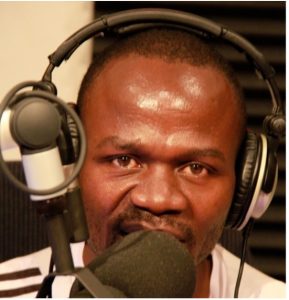 John Cassim is a veteran journalist with over 15 years of experience specializing in environmental and conservation stories whose voice has been crucial in amplifying climate education through radio. His journey began more than a decade ago at Channel Africa based in South Africa, where he honed his skills in environmental reporting before transitioning to running his own conservation portal, ConserveZim, founded in 2022. John was invited by MIET Africa to work on a radio programme. His duties placed him behind the scenes, where he was responsible for analyzing the content of radio shows and collecting feedback from listeners before becoming a radio guest on educational programmes on climate change. “In the programme, we talked a lot about preparedness, what people should be doing, what people should be looking out for, especially during the rainy season, and how people can mitigate,” John explains. “At that moment, the drought was being forecast, so we spoke about the actual issue to do with climate change, what was climate change and how people can actually have it.”
John Cassim is a veteran journalist with over 15 years of experience specializing in environmental and conservation stories whose voice has been crucial in amplifying climate education through radio. His journey began more than a decade ago at Channel Africa based in South Africa, where he honed his skills in environmental reporting before transitioning to running his own conservation portal, ConserveZim, founded in 2022. John was invited by MIET Africa to work on a radio programme. His duties placed him behind the scenes, where he was responsible for analyzing the content of radio shows and collecting feedback from listeners before becoming a radio guest on educational programmes on climate change. “In the programme, we talked a lot about preparedness, what people should be doing, what people should be looking out for, especially during the rainy season, and how people can mitigate,” John explains. “At that moment, the drought was being forecast, so we spoke about the actual issue to do with climate change, what was climate change and how people can actually have it.”
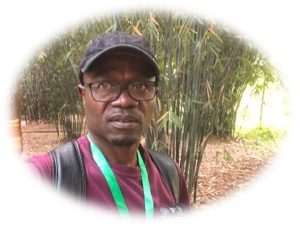 “The radio programmes were incredibly interactive and educational,” John explains. His role involved not just broadcasting but actively engaging with the audience through live quizzes, interactive sessions, and social media. This approach allowed listeners to participate actively, providing feedback and engaging in discussions about climate issues. “We used quizzes to reinforce learning and gauge the effectiveness of the programs. The feedback was overwhelmingly positive, with many listeners showing some understanding of climate issues,” John notes. John’s efforts also included integrating social media platforms like Facebook and WhatsApp group with radio broadcasts. This dual approach allowed for real-time interaction and extended the reach of the programmes beyond traditional radio audiences. “Connecting radio with Facebook allowed us to engage with listeners who might otherwise have missed the broadcasts,” he says.
“The radio programmes were incredibly interactive and educational,” John explains. His role involved not just broadcasting but actively engaging with the audience through live quizzes, interactive sessions, and social media. This approach allowed listeners to participate actively, providing feedback and engaging in discussions about climate issues. “We used quizzes to reinforce learning and gauge the effectiveness of the programs. The feedback was overwhelmingly positive, with many listeners showing some understanding of climate issues,” John notes. John’s efforts also included integrating social media platforms like Facebook and WhatsApp group with radio broadcasts. This dual approach allowed for real-time interaction and extended the reach of the programmes beyond traditional radio audiences. “Connecting radio with Facebook allowed us to engage with listeners who might otherwise have missed the broadcasts,” he says.
This innovative strategy helped to close the distance between different media platforms and increased the programme’s accessibility. “Although we’re still struggling with the 100% reach in the entire country and the digital transformation is still happening in Zimbabwe, new people and new listeners were now taking part in the programme”, he points out.
Despite some challenges, especially with the schedules allocated to the programme, John emphasizes the overall success of the initiative. “We faced some issues with broadcast timing that affected listener habits, but these were managed professionally. The key takeaway is that the programmes were effective in raising awareness and fostering a deeper understanding of climate change,” he reflects. The interactive nature of the broadcasts, combined with the educational content led to a noticeable increase in climate awareness among listeners. “I’m happy that we managed to reach out to a number of youths who participated. They reacted and we responded, so the programmes were very lively”, he concludes.
By the end of the programme, three youth groups contacted John and shared that they were starting a climate youth club in their community. “They wrote to me seeking support to raise awareness in their community. I helped them and that also allowed me to engage with some of the listeners one-to-one, not just relying on the radio programme”, he explains. “One of the groups was started at a primary school in a rural area in Mazowe”, he mentions. In another case, a village had contacted John for advice on how to help him gather people around climate change topics.
“The radio continues to be the most popular mode of communication in Zimbabwe”, John highlights. The potential of radio is not only to inform but also to inspire action, driving meaningful change in communities across the region. John’s contribution to the radio programme has demonstrated how media can be harnessed to foster greater environmental awareness and engagement. As the programme continues to evolve, his insights and strategies will remain vital in shaping the future of climate education.
Michael Jakonya, teacher at Murape Secondary School in Seke District, Zimbabwe
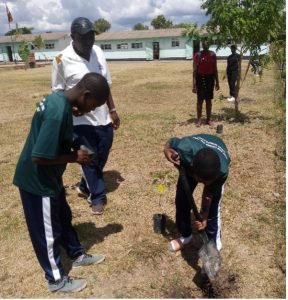 Among the captivated listeners was Michael Jakonya, a dedicated geography teacher at Murape Secondary School in Seke District, a rural area in East Zimbabwe. With a career spanning over three decades, Michael’s commitment to environmental education was reignited when his school joined MIET Africa’s Future Life Now project. He is one out of four educators who is currently responsible for implementing MIET Africa’s educational programmes on climate change in his school. Although climate change is already part of the school’s curriculum, he was the person responsible for engaging students to listen to the radio programme. “We listened to the programme together with our students, but the timing was not so ideal because when the programmes were aired the students were at home with their families”. To overcome this issue, “We distributed 40 radios to students to listen to the programme outside school time” he recounts.
Among the captivated listeners was Michael Jakonya, a dedicated geography teacher at Murape Secondary School in Seke District, a rural area in East Zimbabwe. With a career spanning over three decades, Michael’s commitment to environmental education was reignited when his school joined MIET Africa’s Future Life Now project. He is one out of four educators who is currently responsible for implementing MIET Africa’s educational programmes on climate change in his school. Although climate change is already part of the school’s curriculum, he was the person responsible for engaging students to listen to the radio programme. “We listened to the programme together with our students, but the timing was not so ideal because when the programmes were aired the students were at home with their families”. To overcome this issue, “We distributed 40 radios to students to listen to the programme outside school time” he recounts.
Michael’s students, primarily aged 13-19 years old, found the radio broadcasts to be a superb educational resource. “The way they articulated issues related to climate change improved,” he notes. Inspired by the radio programme, the students decided to start their own projects. As Michael proudly recalls, “we planted 70 trees, and the students were motivated to implement programmes after listening to the radio.”. During this period, Michael observed a significant change in his students. “Their understanding deepened, and we were able to carry out projects on climate change like the climate change club, greening the school, greening the community, and more.” Still, the radio programme’s impact extended beyond education, fostering a spirit of environmental stewardship among the students.
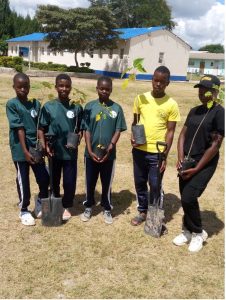 But Michael still believes that much more can be done. “The students who have taken radios home will have a greater advantage compared to the others who did not have access to the radios”. Therefore, “The radio programmes should disseminate more information at different times during the day, tailored to different age groups, and be broadcast on multiple stations in Zimbabwe to maximize reach,” he suggests. In addition, while the radio programme content is suitable for the age group of 13-19 years old, Michael also recommends creating dedicated content for younger students from primary schools. Michael believes that the radio programme has educated and inspired action. Listeners, once disconnected from the concept of climate change, now feel a sense of responsibility and urgency. In addition to the radio programme, Michael’s classroom has taken part in the Youth Climate Dialogues, an initiative led by UN CC:Learn where students from two different countries discuss their perspectives on climate change. “The school participated in three climate change dialogues. The first one was with the students from Chile, and then we had a climate change dialogue with the students from Malawi and Lesotho”. He proudly states that “It was quite an experience for our students. They really enjoyed that, especially when they shared experiences with students from other countries.”
But Michael still believes that much more can be done. “The students who have taken radios home will have a greater advantage compared to the others who did not have access to the radios”. Therefore, “The radio programmes should disseminate more information at different times during the day, tailored to different age groups, and be broadcast on multiple stations in Zimbabwe to maximize reach,” he suggests. In addition, while the radio programme content is suitable for the age group of 13-19 years old, Michael also recommends creating dedicated content for younger students from primary schools. Michael believes that the radio programme has educated and inspired action. Listeners, once disconnected from the concept of climate change, now feel a sense of responsibility and urgency. In addition to the radio programme, Michael’s classroom has taken part in the Youth Climate Dialogues, an initiative led by UN CC:Learn where students from two different countries discuss their perspectives on climate change. “The school participated in three climate change dialogues. The first one was with the students from Chile, and then we had a climate change dialogue with the students from Malawi and Lesotho”. He proudly states that “It was quite an experience for our students. They really enjoyed that, especially when they shared experiences with students from other countries.”
Conclusion
Through the combined efforts of educators, journalists, and broadcasters, the radio programme is proving to be a powerful catalyst for climate awareness and action in Zimbabwe. As the initiative evolves, it promises to further ignite community engagement and drive positive environmental change. This radio initiative has the potential to further empower individuals, fostering a generation that is informed, engaged, and ready to tackle the challenges of climate change head-on.
Background
The Swiss Development Cooperation (SDC)-funded project “UN CC:Learn – The One UN Climate Change Learning Partnership – Phase V” aims to improve education, awareness raising and human and institutional capacity on climate change mitigation, adaptation, impact reduction, and early warning and increase countries’ capacities for effective climate change related planning and management, in developing and in transition countries, focusing on women, youth, indigenous, local and marginalized communities by 2030.
As part of one of its flagship actions, the project targets youth and supports them to identify ways to use knowledge, information and skills and make practical applications that promote climate change in their context [schools, community]”.
MIET Africa, an NGO working with the UN CC:Learn team, focused its contribution on raising awareness and improving knowledge related to climate change to promote youth-led climate action through the medium of the radio. As such, MIET Africa has organized 16 climate change radio episodes per country in Lesotho, Malawi, Zambia, and Zimbabwe in at least 2 languages. This impact story focuses on radio programming in Zimbabwe where two stations broadcast radio programmes on climate change in English and in a Shona/Ndebele mix.
A listenership survey conducted by MIET Africa in 2023 received 638 responses. Key findings include:
- 90 per cent of respondents report that the Climate Action radio provided new information about how to take care of the environment.
- 89 per cent of respondents feel the radio programme has led to changes in their behaviour related to the environment.
- 81 per cent of respondents also felt the Youth Talk Radio helped them in conversations between adolescents and caregivers on Sexual and Reproductive Health and Rights (SRHR) issues.
One hundred seventy-nine or twenty-nine percent of the respondents are from Zimbabwe. Their profile by age and gender illustrates the listeners’ characteristics.

